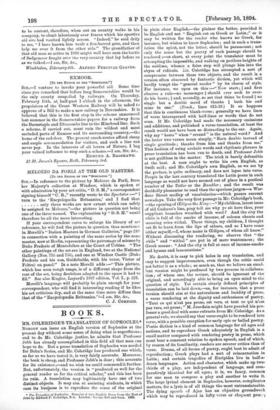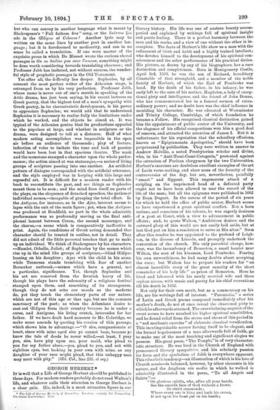BOOKS.
MR. COLERIDGE'S TRANSLATION OF SOPHOOLES.* NOBODY can issue an English version of Sophocles at the present day without some sense of doing what is superfluous ; and to do Mr. Coleridge justice, he admits that Professor Jebb has already accomplished in this field all that man can hope to do. But a prose translation of Sophocles was needed for Bohn's Series, and Mr. Coleridge has produced one which, so far as we have tested it, is very fairly accurate. Moreover, the book is cheap, and Professor Jebb's is dear ; this accounts for its existence ;—and we wish we could commend it further. But, unfortunately, the version is "produced as well for the general reader as for the critical scholar," and this has been its ruin. A translation may legitimately have one of two distinct objects. It may aim at assisting students, in which case its business is to reproduce the sense of the original • Th. Tragedies of Sophoolos. Translat,d into English Prose from the Text of Jebb by Edward P. Coleridge, B.A. London : George Bell and Sons. 1883, in plain clear English,—the plainer the better, provided it be English and not "English cut on Greek or Latin ;" or it may be written for the reader who knows no Greek, for instance, but wishes to know Sophocles; and in such a trans- lation the spirit, not the letter, should be paramount ; not only the sense but the poetry of each passage should be rendered ;—in short, at every point the translator must be attempting the impossible, and walking on perilous heights of the sublime, whence a false step will plunge him into the abyss of ridicule. Mr. Coleridge has attempted a sort 9f compromise between these two objects, and the result is a version often obscured by fantastic diction, yet which will hardly tempt the "general reader" by its charm of style. For instance, we open on this :—" Now start; I and first observe a rule—no messenger I should ever seek to over- do his heats; I and, secondly, so act that thine be found I no single but a double meed of thanks I both his and mine in one." (Trach., lines 615-19.) It so happens that this is continuous blank-verse; generally we have lines of verse interspersed with half-lines or words that do not scan. If Mr. Coleridge had made the necessary omissions and additions, and published a verse-translation, at least the result would not have been so distracting to the ear. Again, why say " heats " when " errand " is the natural word ? And the latter two verses mean simply, "Earn double instead of single gratitude ; thanks from him and thanks from me." This fashion of using archaic words and rhythmic phrases in prose translation has been ran to death, and Professor Jebb is not guiltless in the matter. The trick is barely defensible at the best. A man ought to write his own English, as Swift said; and Mr. Coleridge's own English, as we see by the preface, is quite ordinary, and does not lapse into verse. People in the last century translated the Latin poets in such language as would not have seemed out of place in a poetical number of the Tatter or the Rambler; and the result was decidedly pleasanter to read than the spurious jargon—a War- dour Street medley of vocabularies—which passes current nowadays. Take the very first passage in Mr. Coleridge's book, —the opening of CEdipus the King :—" My children, latest issue of old Cadmus's line, pray tell me why ye sit here thus, your suppliant branches wreathed with wool ? And the city the while is full of the smoke of incense, of solemn chants and moaning cries withal. These things, my children, I thought not fit to learn from the lips of others, and so I have come hither myself,—I, whose name is CEdipas, of whom all know." Without discussing the rendering, we observe that "the while" and " withal " are put in of mere wantonness ; the Greek means : "And the city is full at once of incense-smoke and hymns and lamentations."
No doubt, it is easy to pick holes in any translation, and easy to suggest improvements, even though the critic could not better it as a whole ; so much so, that we believe an excel- lent version might be produced by two persons in collabora- tion; of whom one, the reviser, should be ignorant of the original, and accordingly able to bring an open mind to the question of style. Yet certain clearly defined principles of translation can be laid down,—as, for instance, that a prose version should aim at the naturalness and lucidity of prose, a verse rendering at the dignity and enthusiasm of poetry. "Tout ce qui n'est pas prose, eat vers, et tout ce qui n'est pas vers, eat prose;" M. Jourdain might have puzzled his pro- fessor a good deal with some extracts from Mr. Coleridge. As a general rule, we should say that verse ought to be rendered into verse, with a possible exception for early epic or ballad poetry. Poetic diction is a kind of common language for all ages and nations, and to reproduce Greek adequately in English is a small matter compared with rendering poetry in prose, which must bear a constant relation to spoken speech, and of which, by reason of its familiarity, readers are severer critics than of verse. Drama, of all forms of poetry, ought best to admit of reproduction ; Greek plays had a sort of reincarnation in Latin; and certain tragedies of Euripides live in half-a- dozen languages. Action and character, which make up two- thirds of a play, are independent of language, and com- paratively identical for all ages; it is, we fancy, common for one man to compose a play and another to write it. The large lyrical element in Sophocles, however, complicates matters, for a lyric is of all things the most untranslateable. The dying speech of Ajax has an objective groundwork which may be reproduced in lofty verse or eloquent proE,' ; but who can convey in another language what is meant by Shakespeare's "Full fathom five" song, or the Euhrwou ie ode in the CEdipus at Colonus ? Another lyric may be written on the same lines by another poet in another lan- guage; bat it is foredoomed to mediocrity, and can in no sense be called a translation. If one were master of the exquisite prose in which De Musset wrote the curious choral passages in On ne badine pas avec l'amour, something might be done worth considering towards translating choruses ; and Professor Jebb has imitated, not without success, the wonder- ful style of prophetic passages in the Old Testament.
Yet after all, the difficulty lies deeper. Sophocles, by all consent the most perfect writer of the Athenian stage, is estranged from us by his very perfection. Professor Jebb, whose name is never out of one's mouth in speaking of the Attic drama, has just been saying, in his recent lectures on Greek poetry, that the highest test of a man's sympathy with Greek poetry, in its characteristic development, is his power to appreciate Sophocles; we would add that to understand Sophocles it is necessary to realise fully the limitations under which he worked, and the objects he aimed at. It was typical of the Athenian genius that its productions appealed to the populace at large, and whether in sculpture or the drama, were designed to tell at a distance. Half of what modern acting accomplishes was impossible in the open air before an audience of thousands ; play of feature, inflection of voice to imitate the tone and look of passion would have been lost in that spacious theatre. The mask and the monotone stamped a character upon the whole perfor- mance; the action aimed at was statuesque,—a series of living groups of sculpture passing into one another. An artificial pattern of dialogue corresponded with the artificial utterance, and the style employed was in keeping with this large and reposeful art. It is difficult for a modern reader with his book to reconstitute the past, and see things as Sophocles meant them to be seen ; and the mind fixes itself on parts of the plays, on the eloquence of detached speeches, the pathos of individual scenes,—incapable of grasping the total effect. In the Antigone, for instance, as in the Ajax, interest seems to lapse with the exit of the main figure ; yet, when the Antigone was produced at Bradfield, no part in the whole admirable performance was so profoundly moving as the final anti- phonal lament between Creon, the second messenger, and the chorus,—a scene which is comparatively ineffective in print. Again, the conditions of Greek acting demanded that character should be treated in outline, not in detail. They did not admit of the little personal touches that go to make up an individual. We think of Shakespeare by his characters. —Hamlet, Othello, Juliet; of Sophocles by the scenes which rise up in the mind like groups of sculpture,—blind CEdipus leaning on his daughter ; Ajax with the child in his arms, while Teemessa stands trembling with fear of another Berserker outbreak,—scenes which have a general, not a particular, significance. Yet, though Sophocles and his art are removed from the feverish hurry of life. though his plays have the solemnity of a religious festival stamped upon them, and something of its strangeness, though they do not echo oar moods as the moderns do, yet they touch the elementary parts of our nature, which are not of this age or that age, but are the common sanctuary of the poet ; as when the Athenians desire to cast out CEdipus from their country because he is under a curse, and Antigone, his living crutch, intercedes for her father. If we have dealt hard measure to Mr. Coleridge, we make some amends by quoting his version of this passage,
which shows him to advantage 0 sirs, compassionate at heart, since with mine aged sire ye cannot bear, because ye 'mow the tale of deeds he never willed,—at least, I pray you, sirs, have pity upon me, poor maid, who plead to you for my father alone,—yes, plead to you, and not with sightless eyes, but looking in your own with mine, as any daughter of your race might plead, that this unhappy man
may meet with pity." ((Ed. Col., line 235, et seq.)







































 Previous page
Previous page